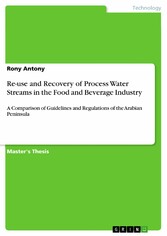Suchen und Finden
Service

Re-use and Recovery of Process Water Streams in the Food and Beverage Industry - A Comparison of Guidelines and Regulations of the Arabian Peninsula
Rony Antony
Verlag GRIN Verlag , 2020
ISBN 9783346094834 , 145 Seiten
Format PDF
Kopierschutz frei
Geräte
Mehr zum Inhalt

Re-use and Recovery of Process Water Streams in the Food and Beverage Industry - A Comparison of Guidelines and Regulations of the Arabian Peninsula
Master's Thesis from the year 2018 in the subject Food Technology, grade: 2.0, University of Copenhagen, course: Food Science and Technology (Water Re-use in the Food processing Sector), language: English, abstract: This thesis is mainly focused on water recovery, national and international water re-use regulations and guidelines and their comparison for the food and beverage industry. Water treatment process is one of the integral steps to achieve desired water quality targets for the water re-use applications. Adoption of Hazard Analysis Critical Control Point system and multiple-barrier approach play vital role to achieve the concept fit for purpose based on end-use application target. Every food processing unit is unique, so that proper tailoring of water treatment and system controlling all water re-use activities are highly essential. Responsibility fragmentation is one of the most critical problems prevents Indian and Middle East nations from taking initiatives for food industry water re-use practical applications. Middle East nations promote water re-use, but the reclaimed water is commonly re-used for irrigation and industrial cooling application. Here the emphasized global food industry water re-use guidelines need to be provided proper insights to set the degree of potability based on their requirement for direct, indirect and non-contact product water re-use applications. Many of the countries set higher water re-use quality standards that of potable water needed normally due to several reasons such as social, political and public acceptability factors despite the fact that WHO provided minimal requirements of potable water quality standards for minimal or indirect product contact water re-use applications. From these circumstances, there is a necessity to reinvestigate the present water re-use regulations and standards so that the findings may generate scope for future amendment of regulations and for the formulation of less stringent water re-use standards in the food industry.
Shop

